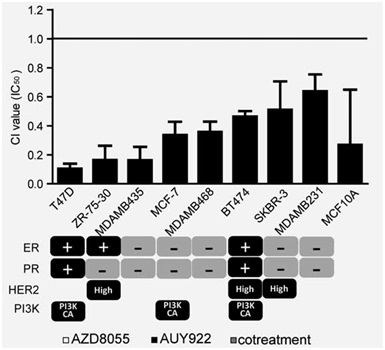
HSP90 Inhibitor AUY922 Abrogates Up-regulation of RTKs by mTOR Inhibitor AZD8055 and Potentiates its Antiproliferative Activity in Human Breast Cancer
Apr 29, 2014 Email"> PrintText Size

The PI3K/mTOR signaling is frequently aberrantly activated in human cancers and mTOR has been proved as promising target for cancer therapy. mTOR kinase inhibitors inhibit the catalytic activity of mTORC1 and mTORC2 and display superior anticancer activity than rapalogs in preclinical studies.
The research group led by Prof. DING Jian in Shanghai Institute of Materia Medica, Chinese Academy of Sciences (SIMM) established the platform in an aim of discovery and research of mTOR kinase inhibitors. By studying the mechanism of a novel mTOR kinase inhibitor X-387 (Biochem Pharmacol 2012; 83:1183-94), they found mTOR inhibition led to activation of upstream RTKs and AKT, which may attenuate the efficacy of mTOR kinase inhibitors. Combination therapy is a promising strategy to improve the efficacy of mTOR inhibitors.
Researchers in DING’s group sought to discover efficient drug combination with mTOR inhibitors by elucidating the survival feedback loops induced by mTOR inhibition in breast cancer. Treatment of breast cancer cells with mTOR inhibitor AZD8055 induced activation of AKT and PI3K, which was accompanied with increase in expression of multiple upstream proteins including EGFR, HER2, HER3 and IRS-1. Different RTKs were revealed to be responsible for the re-activation of AKT by AZD8055 in different breast cancer cell lines. Down-regulation of these proteins differentially enhanced the anti-proliferative activity of AZD8055. As AKT and most of these RTKs are client proteins of HSP90, AZD8055 and an HSP90 inhibitor AUY922 displayed synergistic activity against a panel of human breast cancer cells irrespective their genotypes. AUY922 destabilized multiple tested tyrosine kinases and abrogated activation of AKT induced by AZD8055. Meanwhile, AZD8055 inhibited up-regulation of HSP70 and HSP27 upon AUY922 treatment. Cotreatment of these two drugs demonstrated synergistic activity against triple negative MDA-MB468 xenograft without enhanced toxicity.
This study demonstrated that combination of AZD8055 and AUY922 demonstrated synergistic activity against various types of breast cancer and established a mechanistic rationale for a combination approach using catalytic mTOR kinase inhibitor and HSP90 inhibitor in the treatment of breast cancer.
This study has been recently published in International Journal of Cancer with Professors DING Jian and MENG Linghua as corresponding authors and was supported by National Natural Science Foundation of China and National Science & Technology Major Project “Key New Drug Creation and Manufacturing Program”.

mTOR inhibitor and HSP90 inhibitor splayed synergistic activity against a panel of human breast cancer cells irrespective their genotypes. (Image by SIMM)
The PI3K/mTOR signaling is frequently aberrantly activated in human cancers and mTOR has been proved as promising target for cancer therapy. mTOR kinase inhibitors inhibit the catalytic activity of mTORC1 and mTORC2 and display superior anticancer activity than rapalogs in preclinical studies.
The research group led by Prof. DING Jian in Shanghai Institute of Materia Medica, Chinese Academy of Sciences (SIMM) established the platform in an aim of discovery and research of mTOR kinase inhibitors. By studying the mechanism of a novel mTOR kinase inhibitor X-387 (Biochem Pharmacol 2012; 83:1183-94), they found mTOR inhibition led to activation of upstream RTKs and AKT, which may attenuate the efficacy of mTOR kinase inhibitors. Combination therapy is a promising strategy to improve the efficacy of mTOR inhibitors.
Researchers in DING’s group sought to discover efficient drug combination with mTOR inhibitors by elucidating the survival feedback loops induced by mTOR inhibition in breast cancer. Treatment of breast cancer cells with mTOR inhibitor AZD8055 induced activation of AKT and PI3K, which was accompanied with increase in expression of multiple upstream proteins including EGFR, HER2, HER3 and IRS-1. Different RTKs were revealed to be responsible for the re-activation of AKT by AZD8055 in different breast cancer cell lines. Down-regulation of these proteins differentially enhanced the anti-proliferative activity of AZD8055. As AKT and most of these RTKs are client proteins of HSP90, AZD8055 and an HSP90 inhibitor AUY922 displayed synergistic activity against a panel of human breast cancer cells irrespective their genotypes. AUY922 destabilized multiple tested tyrosine kinases and abrogated activation of AKT induced by AZD8055. Meanwhile, AZD8055 inhibited up-regulation of HSP70 and HSP27 upon AUY922 treatment. Cotreatment of these two drugs demonstrated synergistic activity against triple negative MDA-MB468 xenograft without enhanced toxicity.
This study demonstrated that combination of AZD8055 and AUY922 demonstrated synergistic activity against various types of breast cancer and established a mechanistic rationale for a combination approach using catalytic mTOR kinase inhibitor and HSP90 inhibitor in the treatment of breast cancer.
This study has been recently published in International Journal of Cancer with Professors DING Jian and MENG Linghua as corresponding authors and was supported by National Natural Science Foundation of China and National Science & Technology Major Project “Key New Drug Creation and Manufacturing Program”.

mTOR inhibitor and HSP90 inhibitor splayed synergistic activity against a panel of human breast cancer cells irrespective their genotypes. (Image by SIMM)
CAS Institutes
There are 124 Institutions directly under the CAS by the end of 2012, with 104 research institutes, five universities & supporting organizations, 12 management organizations that consist of the headquarters and branches, and three other units. Moreover, there are 25 legal entities affiliated and 22 CAS invested holding enterprisesThere are 124 I...>> more
Contact Us

Chinese Academy of Sciences
Add: 52 Sanlihe Rd., Xicheng District, Beijing, China
Postcode: 100864
Tel: 86-10-68597592 (day) 86-10-68597289 (night)
Fax: 86-10-68511095 (day) 86-10-68512458 (night)
E-mail: cas_en@cas.cn

